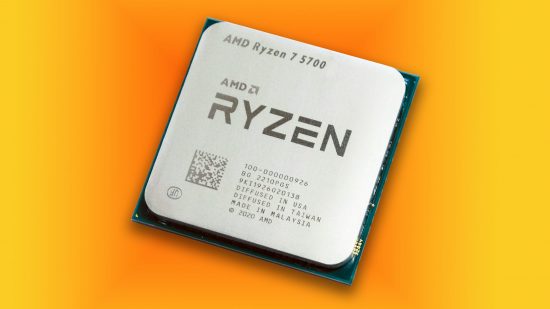The latest budget eight-core CPU from AMD has just landed like an airship made from a particularly heavy metal, as its gaming performance is well below expectations. The problem with the AMD Ryzen 7 5700 is all down to its cache, or rather its lack of it, not only in comparison to the beefed up Ryzen 7 5700X3D, but also when you put it next to the veteran Ryzen 7 5700X.
Originally announced at CES this year, the Ryzen 7 5700 formed part of a surprise announcement from AMD that it planned to keep its old Socket AM4 platform alive with a new lineup of CPUs. However, the latest benchmarks show that this new CPU is very unlikely to be one of the best gaming CPU options. If you’re planning to build a gaming PC, this new chip looks very much like one to avoid.
AMD’s X-branded CPUs are usually the first ones to land, with the company then following up with non-X CPUs a few months down the line. If the CPU doesn’t have an X in its model number, then it usually has the same core spec as the X model, but just runs at a lower clock speed. For example, the Ryzen 5 5600 has the same number of cores, and the same cache setup, as the Ryzen 5 5600X, but its boost clock is only 4.4GHz, compared with 4.6GHz on the latter.
The same logic also applies to the Ryzen 7 5800 when compared with the 5800X, and the same has been true throughout the Ryzen brand’s history. Even the Ryzen 7 1700 has the same core spec as the 1700X – it’s just the clock speed that’s different. However, the Ryzen 7 5700 is actually a very different CPU from the Ryzen 7 5700X.

The new CPU does have the same core count, with eight Zen 3 cores and eight threads, and it even has the same 4.6GHz boost clock as the 5700X. However, the Ryzen 7 5700 only has 16MB of L3 cache, compared with 32MB on the 5700X. That means the new Ryzen 7 5700 is going to spend a lot more time accessing (slower) main system memory than the 5700X, and this has a dramatic impact on gaming frame rates.
PC tech YouTube channel Hardware Unboxed has put the new CPU through its paces in the video above, and the findings are startling, with the lack of cache having a significant impact on gaming performance. In Hitman 3, for example, the Ryzen 7 5700 averages 146fps, compared with 178fps on the 5700X. In Cyberpunk 2077 Phantom Liberty, the 5700 also averages 99fps, while the 5700X averages 112fps. Comparatively, the new cached-up 5700X3D averages 137fps in this test.
If you take the average of all the channel’s test games, the 5700’s 95fps frame rate is significantly behind the 110fps of the 5700X. That all goes to show that clock speed and core counts aren’t the whole story – if you don’t have enough cache then you won’t get the frame rates. Basically, the Ryzen 7 5700 is a Ryzen 7 5700G, but without the integrated Radeon Vega 8 GPU, and with a slightly slower base clock.
Why has AMD done this? This is pure speculation, but we suspect that AMD was looking for a way to use the Cezanne dies from its Zen 3 APU lineup of CPUs with integrated graphics, such as the Ryzen 7 5700G. There may well be dies where the GPU portion didn’t make the grade, and issuing a new CPU based on these dies, but without the integrated GPU, enables AMD to still sell these chips.
Whatever the reason, the AMD Ryzen 7 5700 looks like a CPU to avoid if you’re a gamer. If you’re looking to buy a new gaming CPU that doesn’t cost the earth, check out our Ryzen 5 7600X review, as well as our Core i5-14600K review from Intel’s current lineup.
